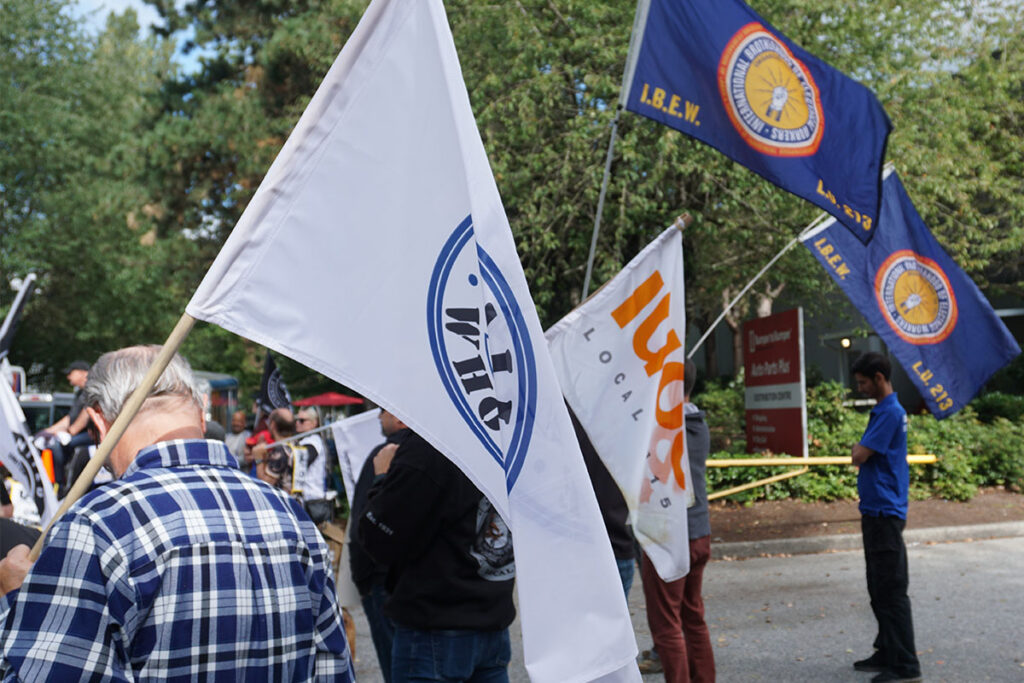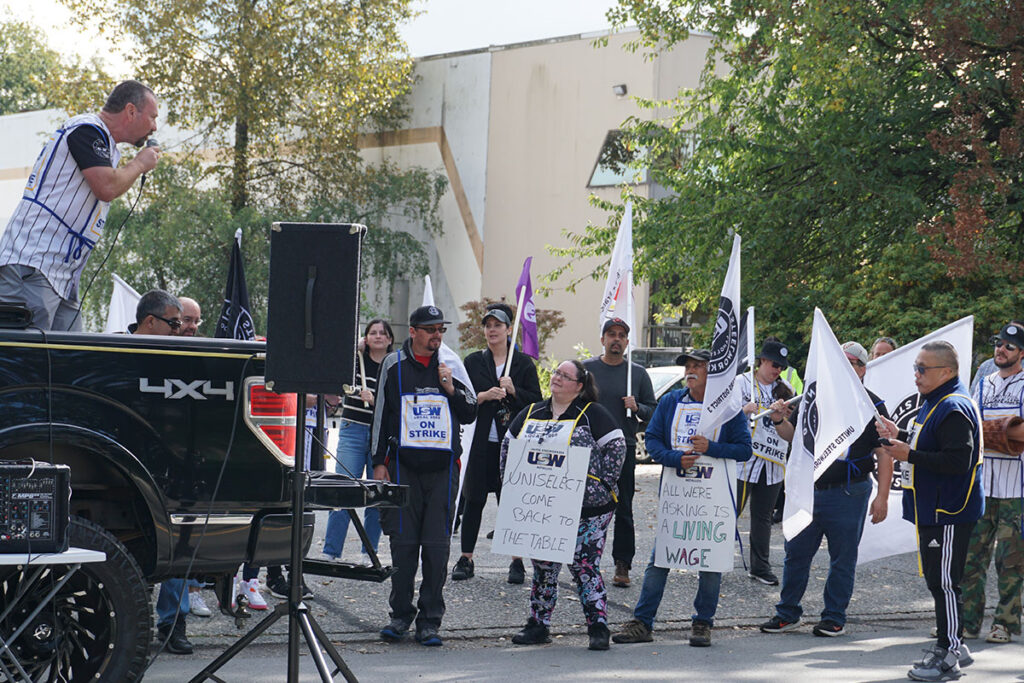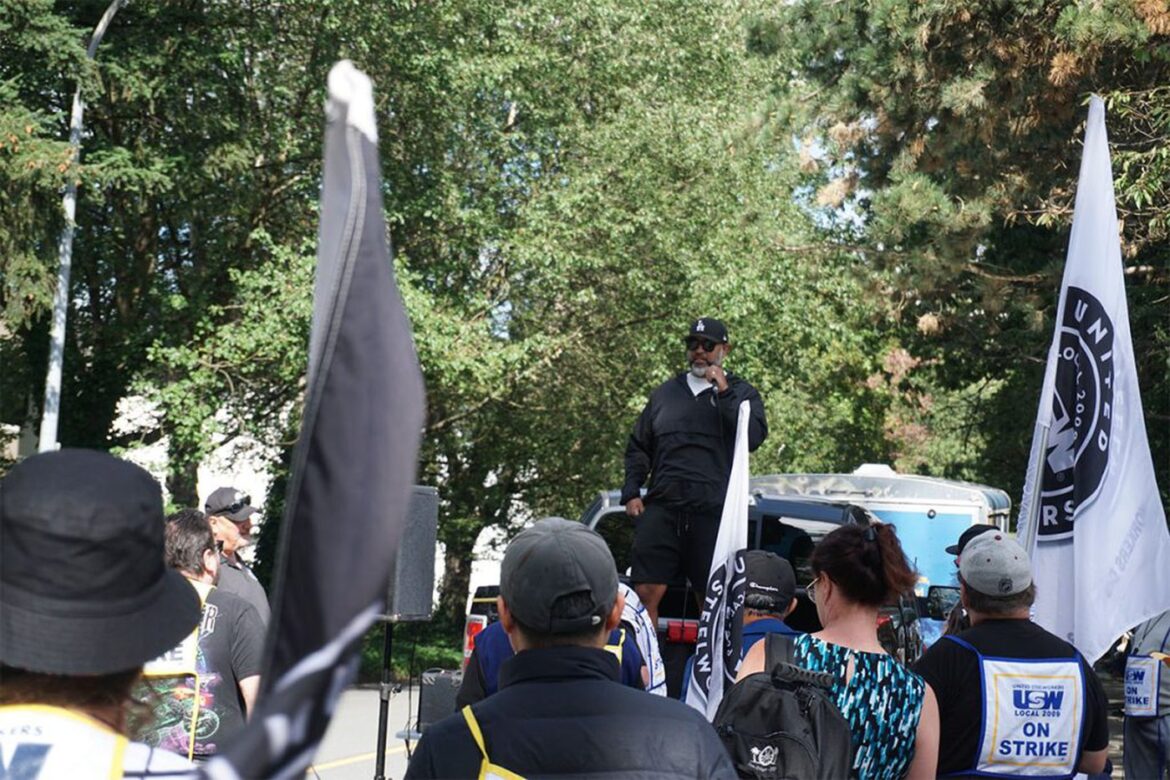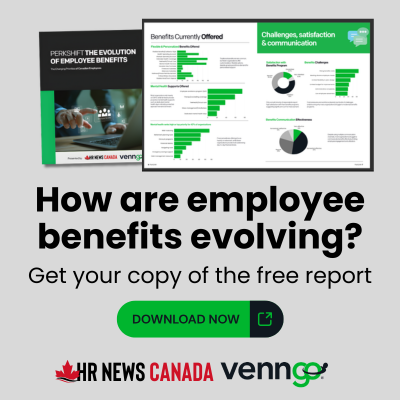By Patrick Penner | Tri-Cities Dispatch
Striking workers of the United Steelworkers (USW) Local 2009 held a rally outside Uni-Select, Bumper to Bumper, in Coquitlam, B.C., on Wednesday afternoon, demanding a wage increase from the auto parts distributor.
Around 60 workers from numerous unions, labour leaders, retirees and family members set up picket lines on Glacier Street in the city’s Mayfair industrial area on Sept. 18, waving white flags, chanting slogans, blasting music, and making speeches from a truck-bed stage.
Local 2009 President Al Bieksa – father of former Canucks defenceman Kevin Bieksa – said the company either doesn’t understand, or doesn’t care, that its Coquitlam employees are making “poverty wages,” and struggle to keep up with the cost of living.
“The price of fuel hasn’t come down, has it? The price of groceries hasn’t come down, has it?” Bieksa said to the crowd. “The only thing that seems to be coming down is workers wages.”
Local 2009’s collective agreement expired at the end of April, and its members have been on strike since Sept. 3, rejecting two previous offers from the company.
The union said that when inflation peaked at 8 percent in 2022, wages at Uni-Select only increased by 1.3 percent, followed by a 1.2 percent increase in 2023, eroding its members’ buying power.

Bieksa said Uni-Select is “not a mom and pop store,” noting it posted $2.38 billion in revenue in its 2023 annual report. He said that company, which employs 1,400 workers, boasted in the report that it earned $179,000 per employee.
One Uni-Select worker told the Dispatch that he was broke and couldn’t afford to go on strike, but some of his colleagues had been working there for 40 years and were still stuck making $24 an hour.
B.C.’s living wage is calculated a $25.68 per hour, according to Living Wage Canada, while minimum wage is set at $17.40 per hour.
Tamara Marshall, financial secretary for Local 2009, said the company pays its employees in Alberta and Quebec $5 to $8 dollars more per hour for the exact same jobs.
Bieksa said the top end of Uni-Select’s wages are the very lowest end of the 80 collective agreements that Local 2009 negotiates. He said employees have to work overtime just to pay for necessities, and are still going into debt.
“This is their conundrum,” Bieksa said. “They can’t afford to be on strike, but can’t afford to go back and work for poverty wages either.”
He said the company has refused to budge on wage increases, and even attempted to bring in workers from a temp agency before the union filed a grievance, but workers have still held out for a better contract. The parties are set to return to the negotiating table tomorrow.
The Dispatch reached out to the company for comment, but did not receive a response by deadline.
A wide array of labour organizers attended the rally, including administrators of the New Westminster and Vancouver district labour councils, and members from CUPE, MoveUP, ILWU, IUOE, IBEW and Unifor.
Janet Andrews, secretary treasurer of the New Westminster & District Labour Council, said that combined with Vancouver labour council, they represent more than 125,000 union members.
“Uni-Select, you are tangling with Metro labour,” Andrews said. “We’re not going to ask nicely. We are here to demand respect.”
Bieksa said that other unions have subsidized the strike effort, and the workers are prepared to strike for months.
“They’re very motivated,” he said. “That’s why today’s rally means so much to everybody, knowing that there is solidarity.”







